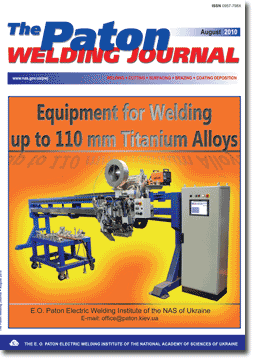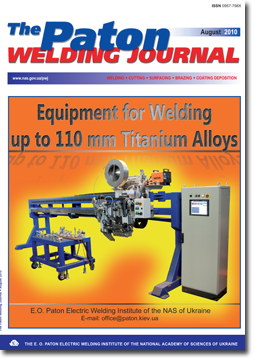| 2010 №08 (06) | 2010 №08 (08) |

TPWJ, 2010, #8, 32-39 pages
INFLUENCE OF GETTER ADDITIVES ON HYDROGEN EMBRITTLEMENT OF WELDED JOINTS OF STRUCTURAL MATERIALS OF NPP EQUIPMENT
Journal The Paton Welding Journal
Publisher International Association «Welding»
ISSN 0957-798X (print)
Issue № 8, 2010 (August)
Pages 32-39
Authors
V.M. AZHAZHA, S.D. LAVRINENKO, G.D. TOLSTOLUTSKAYA, N.N. PILIPENKO, Yu.P. BOBROV, A.P. SVINARENKO and A.N. AKSENOVA
National Science Center «Kharkov Institute of Physics and Technology», NASU, Kharkov, Ukraine
Abstract
The paper gives analysis of literature data on searching for getter materials, which can be recommended for creation of hydrogen traps by introducing them into structural materials and welded joints of NPP equipment. Hydride-forming alloys and compounds based on zirconium, titanium and vanadium are considered as the most promising ones. Rare-earth metals and their alloys, binary compounds of rare-earth metals with transition metals of VIII group are proposed as materials of getter additives to create hydrogen traps in structural materials and welded joints of NPP equipment.
Keywords: structural materials, service life, physical simulation, weld metal, hydrogen, getter additives, nuclearphysics research
Received: ??.??.??
Published: 28.08.10
References
1. Azhazha, V.M., Bobrov, Yu.P., Bovda, A.M. et al. (2006) Examination of gas emission in vacuum heating of hydrogenated alloy Nd-Fe-B. Voprosy Atomn. Nauki i Tekhniki. Vakuum, Pure Metals, Superconductors Series, 1, 156-159.
2. (1996) Constitutional diagrams of binary metallic systems: Refer. Book. Ed. by N.P. Lyakishev. Vol. 1. Moscow: Mashinostroenie.
3. Wirth, S., Skomski, R., Coey, J.M.D. (1998) Hydrogen in R2Fe17 intermetallic compounds. In: Structural, thermodynamics and magnetic properties: Res. Pap. Phys. Astronomy, 55(9), 5700-5707.
4. Nikitin, S.A., Ovchenkov, E.A., Tereshina, I.S. et al. (1998) Synthesis of ternary hydrides and nitrides R2Fe17 (R-Y, Tb, Dy, Ho, Er) and effect of interstitial elements (H2, N2) on magnetic anisotropy and magnetostriction. Metally, 2, 111-116.
5. Kolachev, B.A., Shalin, R.E., Iliin, A.A. (1995) Hydrogenaccumulating alloys: Refer. Book. Moscow: Metallurgiya.
6. Leblond, T., Paul-Boncour, V., Cuevas, F. et al. (2009) Fernandez study of the multipeak deuterium thermodesorption in YFe2Dx (1.3 < x < 4.2) by DSC, TD and in situ neutron diffraction. Int. J. Hydrogen Energy, 34, Issue 5, 11-14.
7. (1996) Data base PCPDF. Int. Center for Diffraction Data, 20-23.
8. Zelensky, V.F., Neklyudov, I.M. (1991) Effect of rare-earth elements on radiation resistance of materials. In: Proc. of Int. Conf. on Radiation Materials Science (Kharkov, Sept. 1991). Vol. 2. Kharkov, 45-57.
9. Bakaj, A.S., Gann, V.V., Zelensky, V.F. et al. (1990) Alternative polarity recombination centers of point defects. Effects of Radiation on Materials, 1, 623-631.
10. Savitsky, E.M., Burkhanov, G.S. (1980) Rare metals and alloys. Physico-chemical analysis and materials science. Moscow: Nauka.
11. Pokhodnya, I.K., Yavdoshchin, I.R., Paltsevich, A.P. et al. (2004) Metallurgy of arc welding. Interaction of metal with gases. Kiev: Naukova Dumka.
12. Azhazha, V.M., Lavrinenko, S.D., Svinarenko, A.P. et al. (2009) Getter alloys for creation of hydrogen traps in structural materials and welded joints of nuclear power plant equipment. Voprosy Atomn. Nauki i Tekhniki. Vakuum, Pure Metals, Superconductors Series, 6, 127-133.
13. Skomski, R. (2006) Hydrogen in R2Fe17 intermetallic compounds. In: Structural, thermodynamics and magnetic properties: Res. Pap. Phys. Astronomy, 5700-5707.
14. Kakinichi, K., Itagaki, N., Furuya, T. et al. (2004) Role of iron for hydrogen absorption mechanism in zirconium alloys. J. ASTM Int., 1(10), 349-365.
15. Karpov, S.A., Kopanets, I.E., Neklyudov, I.M. et al. (2004) Combination of method of nuclear reactions, thermodesorption spectrometry and double-beam radiation during investigation of helium and hydrogen behavior in structural materials. In: Proc. of 14th Int. Meeting on Radiation Physics of Solid (Sevastopol, 5-10 July 2004). Sevastopol, 592-596.
The cost of subscription/purchase order journals or individual articles
| Journal/Currency | Annual Set | 1 issue printed |
1 issue |
one article |
| TPWJ/USD | 384 $ | 32 $ | 26 $ | 13 $ |
| TPWJ/EUR | 348 € | 29 € | 24 € | 12 € |
| TPWJ/UAH | 7200 UAH | 600 UAH | 600 UAH | 280 UAH |
| AS/UAH | 1800 UAH | 300 UAH | 300 UAH | 150 UAH |
| AS/USD | 192 $ | 32 $ | 26 $ | 13 $ |
| AS/EUR | 180 € | 30 € | 25 € | 12 € |
| SEM/UAH | 1200 UAH | 300 UAH | 300 UAH | 150 UAH |
| SEM/USD | 128 $ | 32 $ | 26 $ | 13 $ |
| SEM/EUR | 120 € | 30 € | 25 € | 12 € |
| TDNK/UAH | 1200 UAH | 300 UAH | 300 UAH | 150 UAH |
| TDNK/USD | 128 $ | 32 $ | 26 $ | 13 $ |
| TDNK/EUR | 120 € | 30 € | 25 € | 15 € |
AS = «Automatic Welding» - 6 issues per year;
TPWJ = «PATON WELDING JOURNAL» - 12 issues per year;
SEM = «Electrometallurgy Today» - 4 issues per year;
TDNK = «Technical Diagnostics and Non-Destructive Testing» - 4 issues per year.


